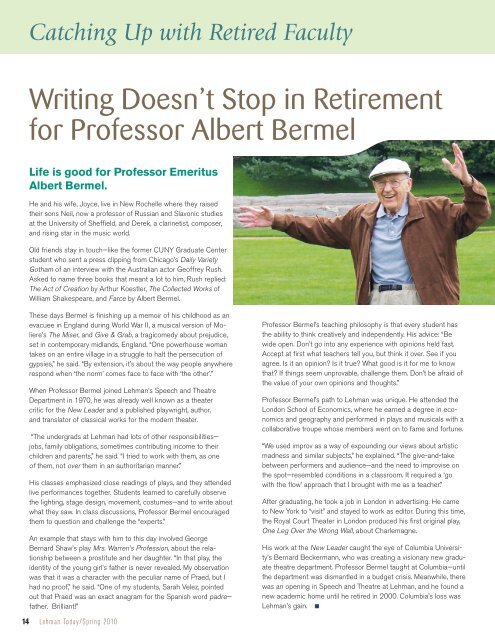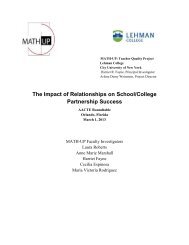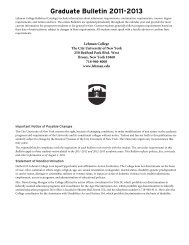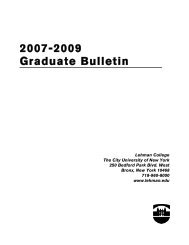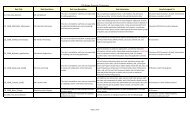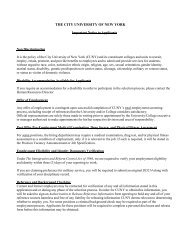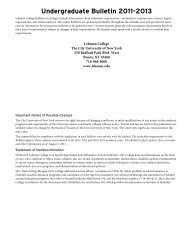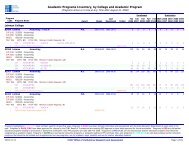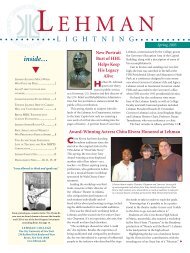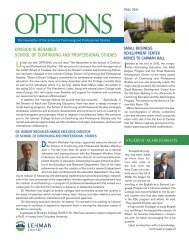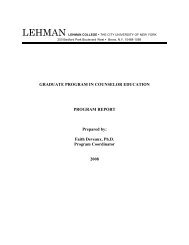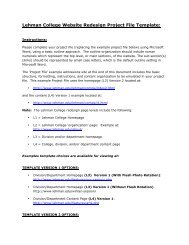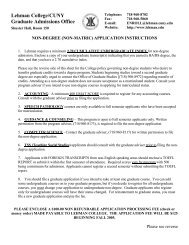Entering a New Era of Multimedia - Lehman College
Entering a New Era of Multimedia - Lehman College
Entering a New Era of Multimedia - Lehman College
Create successful ePaper yourself
Turn your PDF publications into a flip-book with our unique Google optimized e-Paper software.
Catching Up with Retired Faculty<br />
Writing Doesn’t Stop in Retirement<br />
for Pr<strong>of</strong>essor Albert Bermel<br />
Life is good for Pr<strong>of</strong>essor Emeritus<br />
Albert Bermel.<br />
He and his wife, Joyce, live in <strong>New</strong> Rochelle where they raised<br />
their sons Neil, now a pr<strong>of</strong>essor <strong>of</strong> Russian and Slavonic studies<br />
at the University <strong>of</strong> Sheffield, and Derek, a clarinetist, composer,<br />
and rising star in the music world.<br />
Old friends stay in touch—like the former CUNY Graduate Center<br />
student who sent a press clipping from Chicago’s Daily Variety<br />
Gotham <strong>of</strong> an interview with the Australian actor Ge<strong>of</strong>frey Rush.<br />
Asked to name three books that meant a lot to him, Rush replied:<br />
The Act <strong>of</strong> Creation by Arthur Koestler, The Collected Works <strong>of</strong><br />
William Shakespeare, and Farce by Albert Bermel.<br />
These days Bermel is finishing up a memoir <strong>of</strong> his childhood as an<br />
evacuee in England during World War II, a musical version <strong>of</strong> Moliere’s<br />
The Miser, and Give & Grab, a tragicomedy about prejudice,<br />
set in contemporary midlands, England. “One powerhouse woman<br />
takes on an entire village in a struggle to halt the persecution <strong>of</strong><br />
gypsies,” he said. “By extension, it’s about the way people anywhere<br />
respond when ‘the norm’ comes face to face with ‘the other’.”<br />
When Pr<strong>of</strong>essor Bermel joined <strong>Lehman</strong>’s Speech and Theatre<br />
Department in 1970, he was already well known as a theater<br />
critic for the <strong>New</strong> Leader and a published playwright, author,<br />
and translator <strong>of</strong> classical works for the modern theater.<br />
“The undergrads at <strong>Lehman</strong> had lots <strong>of</strong> other responsibilities—<br />
jobs, family obligations, sometimes contributing income to their<br />
children and parents,” he said. “I tried to work with them, as one<br />
<strong>of</strong> them, not over them in an authoritarian manner.”<br />
His classes emphasized close readings <strong>of</strong> plays, and they attended<br />
live performances together. Students learned to carefully observe<br />
the lighting, stage design, movement, costumes—and to write about<br />
what they saw. In class discussions, Pr<strong>of</strong>essor Bermel encouraged<br />
them to question and challenge the “experts.”<br />
An example that stays with him to this day involved George<br />
Bernard Shaw’s play Mrs. Warren’s Pr<strong>of</strong>ession, about the relationship<br />
between a prostitute and her daughter. “In that play, the<br />
identity <strong>of</strong> the young girl’s father is never revealed. My observation<br />
was that it was a character with the peculiar name <strong>of</strong> Praed, but I<br />
had no pro<strong>of</strong>,” he said. “One <strong>of</strong> my students, Sarah Velez, pointed<br />
out that Praed was an exact anagram for the Spanish word padre—<br />
father. Brilliant!”<br />
14 <strong>Lehman</strong> Today/Spring 2010<br />
Pr<strong>of</strong>essor Bermel’s teaching philosophy is that every student has<br />
the ability to think creatively and independently. His advice: “Be<br />
wide open. Don’t go into any experience with opinions held fast.<br />
Accept at first what teachers tell you, but think it over. See if you<br />
agree. Is it an opinion? Is it true? What good is it for me to know<br />
that? If things seem unprovable, challenge them. Don’t be afraid <strong>of</strong><br />
the value <strong>of</strong> your own opinions and thoughts.”<br />
Pr<strong>of</strong>essor Bermel’s path to <strong>Lehman</strong> was unique. He attended the<br />
London School <strong>of</strong> Economics, where he earned a degree in economics<br />
and geography and performed in plays and musicals with a<br />
collaborative troupe whose members went on to fame and fortune.<br />
“We used improv as a way <strong>of</strong> expounding our views about artistic<br />
madness and similar subjects,” he explained. “The give-and-take<br />
between performers and audience—and the need to improvise on<br />
the spot—resembled conditions in a classroom. It required a ‘go<br />
with the flow’ approach that I brought with me as a teacher.”<br />
After graduating, he took a job in London in advertising. He came<br />
to <strong>New</strong> York to “visit” and stayed to work as editor. During this time,<br />
the Royal Court Theater in London produced his first original play,<br />
One Leg Over the Wrong Wall, about Charlemagne.<br />
His work at the <strong>New</strong> Leader caught the eye <strong>of</strong> Columbia University’s<br />
Bernard Beckermann, who was creating a visionary new graduate<br />
theatre department. Pr<strong>of</strong>essor Bermel taught at Columbia—until<br />
the department was dismantled in a budget crisis. Meanwhile, there<br />
was an opening in Speech and Theatre at <strong>Lehman</strong>, and he found a<br />
new academic home until he retired in 2000. Columbia’s loss was<br />
<strong>Lehman</strong>’s gain.


